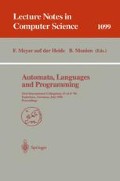Abstract
The aim of this paper is to study the first order theory of the successor, interpreted on finite words. More specifically, we complete the study of the hierarchy based on quantifier alternations (or ∑n-hierarchy). It was known (Thomas, 1982) that this hierarchy collapses at level 2, but the expressive power of the lower levels was not characterized effectively. We give a semigroup theoretic description of the expressive power of ∑1, the existential formulas, and ß∑1, the boolean combinations of existential formulas. Our characterization is algebraic and makes use of the syntactic semigroup, but contrary to a number of results in this field, is not in the scope of Eilenberg's variety theorem, since ßε1-definable languages are not closed under residuals.
An important consequence is the following: given one of the levels of the hierarchy, there is polynomial time algorithm to decide whether the language accepted by a deterministic n-state automaton is expressible by a sentence of this level.
Preview
Unable to display preview. Download preview PDF.
References
J. Almeida, Finite semigroups und universal algebra, Series in Algebra Vol 3, Word Scientific, Singapore, 1994.
D. Beauquier and J.-E. Pin, Factors of words, in Automata, Languages and Programming, (G. Ausiello, M. Dezani-Ciancaglini and S. Ronchi Della Rocca, eds.), Lecture Notes in Comput. Sci. 372, Springer, (1989), 63–79.
D. Beauquier and J.-E. Pin, Languages and scanners, Theoret. Comput. Sci. 84, (1991), 3–21.
J. A. Brzozowski and I. Simon, Characterizations of locally testable languages, Discrete Math. 4, (1973), 243–271.
J. R. Büchi, On a decision method in restricted second-order arithmetic, in Proc. 1960 Int. Congr. for Logic, Methodology and Philosophy of Science, Stanford Univ. Press, Standford, (1962), 1–11.
S. Cho and D. T. Huynh, Finite automaton aperiodicity is PSPACE-complete, Theoret. Comput. Sci. 88, (1991), 99–116.
Ebbinghaus and Flum, Finite Model Theory, Springer, (1995).
S. Eilenberg, Automata, languages and machines, Vol. B, Academic Press, New York, 1976.
H. Gaifman, On local and non-local properties, in Proc. of the Herbrandt Symposium, Logic Colloquium'81 (J. Stern, ed.), Studies in Logic 107, North-Holland, Amsterdam, (1982), 105–135.
R. McNaughton, Algebraic decision procedures for local testability, Math. Syst. Theor. 8, (1974), 60–76.
R. McNaughton and S. Pappert, Counter-free Automata, MIT Press, 1971.
D. Perrin, Automata, Chapter 1 in Handbook of Theoretical Computer Science (Van Leeuwen, J. ed.), Vol B: Formal Models and Semantics, Elsevier (1990).
D. Perrin and J.-E. Pin, First order logic and star-free sets, J. Comput. System Sci. 32, (1986), 393–406.
J.-E. Pin, Variétés de langages formels, Masson, Paris, 1984. English translation: Varieties of formal languages, Plenum, New-York, 1986.
J.-E. Pin, Logic, Semigroups and Automata on Words, Theor. Comp. Sc., to appear.
J.-E. Pin, Finite semigroups and recognizable languages: an introduction, in NATO Advanced Study Institute Semigroups, Formal Languages and Groups, J. Fountain (ed.), Kluwer academic publishers, (1995), 1–32.
J.-E. Pin, A variety theorem without complementation, Izvestiya VUZ Matematika 39 (1995) 80–90. English version, Russian Mathem. (Iz. VUZ) 39, (1995), 74–83.
M. P. Schützenberger, On finite monoids having only trivial subgroups, Information and Control 8, (1965), 190–194.
J. Stern, Characterization of some classes of regular events, Theoret. Comp. Sci. 35, (1985), 17–42.
J. Stern, Complexity of some problems from the theory of automata, Inform, and Control 66, (1985), 63–176.
H. Straubing, Finite automata, formal logic and circuit complexity, Birkhäuser, 1994.
H. Straubing, D. Thérien and W. Thomas, Regular Languages Defined with Generalized Quantifiers, in Proc. 15th ICALP, Springer Lecture Notes in Computer Science 317, (1988), 561–575.
D. Thérien and A. Weiss, Graph congruences and wreath products, J. Pure Applied Algebra 35, (1985), 205–215.
W. Thomas, Classifying regular events in symbolic logic, J. Comput. Syst. Sci 25, (1982), 360–375.
W. Thomas, On logics, tilings, and automata, Proc. 18th ICALP, Madrid. (J. Leach Albert et al., eds.), Lect. Notes in Comp. Sci. 510, Springer, Berlin, (1991), 441–454.
W. Thomas, On the Ehrenfeucht-Fraïssé Game in Theoretical Computer Science, TAPSOFT'93, M. C. Gaudel, J. P. Jouannaud (Eds.), Lect. Notes in Comp. Sci. 668, Springer, Berlin, (1993), 559–568.
Th. Wilke, Locally threshold testable languages of infinite words, in STACS 93, P. Enjalbert, A. Finkel, K. W. Wagner (Eds.), Lect. Notes in Comp. Sci. 665, Springer, Berlin, (1993), 607–616.
Author information
Authors and Affiliations
Editor information
Rights and permissions
Copyright information
© 1996 Springer-Verlag Berlin Heidelberg
About this paper
Cite this paper
Pin, JE. (1996). The expressive power of existential first order sentences of büchi's sequential calculus. In: Meyer, F., Monien, B. (eds) Automata, Languages and Programming. ICALP 1996. Lecture Notes in Computer Science, vol 1099. Springer, Berlin, Heidelberg. https://doi.org/10.1007/3-540-61440-0_137
Download citation
DOI: https://doi.org/10.1007/3-540-61440-0_137
Published:
Publisher Name: Springer, Berlin, Heidelberg
Print ISBN: 978-3-540-61440-1
Online ISBN: 978-3-540-68580-7
eBook Packages: Springer Book Archive

